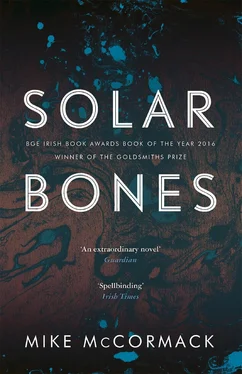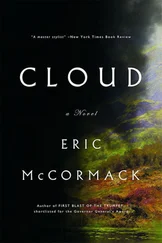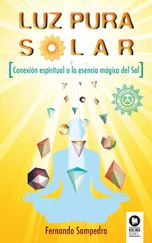fixing an accurate scale and placing of himself in this world as
he would show me time and again, most memorably, later in his life when his work as a farmer and fisherman was well behind him, that Sunday afternoon when we went out on the bay for a trip, Joe Needham and ourselves, just the three of us taking the trawler for a quick run up to Clare Island where Joe had set pots for crabs and lobsters and
it was a beautiful summer’s afternoon when we set out, a high, clear sky over us so that you could see the whole of the bay in every direction, from Westport Quay in the east, out to the horizon beyond Turk and Clare as we passed back the coast, keeping close to the shore so that the sea opened out to its full reach ahead of us and we could see across to Mulranny which, in the afternoon heat, was a blur, a distant shadow of coastline where sky and sea came together and once again the whole expanse of this blue day recalled my childhood conviction that there was nothing greater than the sea, no other width or breadth which could surpass or encompass it because the older I got and the more I had advanced in my work as an engineer the more certain I had become that
out there, on the blue bay
was where my sense of scale and ratio was established during my childhood, specifically during those summer months when my father and I would set off from Carramore Pier in his small currach to set pots for crab and lobster along the shoreline, a dozen pots stacked in the bows of the currach which we would string out beyond the low-water mark, pink and blue buoys riding the swell behind us as we drifted out deeper on the tide, and it was most likely during these lull periods when I would sit in the back of the currach trailing lines for mackerel or pollock and watching the land recede into the distance that I came to a full sense of the world in its broadest span, the sky overhead and the calm surface of the sea spreading out all around us while my father sat smoking in the middle of the boat with his boots pushed out in front of him, letting the currach drift on the tide, happy as I could imagine any man to be
in the swelling immensity of the bay, with the lines cutting the surface of the water behind and it must have been one such mood he woke from one day to tell me the story of how, when he was a child himself
a massive ship came into Clew Bay, a ship from god-knows-where with no recognisable flags or markings on it, a huge ship which bow-to-stern was over a mile long and with four massive funnels on it coughing up big balls of black deatach and armed with cannon and other artillery along its sides when it anchored in the middle of the bay for a full day before it fired two shells onto the mainland, whether as warning or salute no one could say, but one of them destroyed a cart-house in Durless and it was never known where the second one landed or if it did land because for all he knew it might still be orbiting the earth or still flying off into space fifty years later, after which the ship unloaded enough raw timber onto boats from Westport Quay to roof seventy houses, but only after it had been cut into workable lengths — a big job in itself as this timber was so dense and close-grained it destroyed every saw blade that was set to it, shearing teeth and buckling so many, one after another, that Kelly’s timber yard had to send to Sheffield for specially tempered blades before the job could be done, the heavy balks of timber now running smoothly through the bandsaw, but any man who ever worked on the cutting of that timber never had the full of his health afterwards because there was nothing but blue dust out of it, which lodged in their lungs and sent several of them to early graves, five or six men with young families left behind them, drifting away into oblivion the same way the ship itself left the bay, turning on its own central axis with its massive diesel engines churning and pushing it out into the Atlantic beyond whence it came and to where it returned and
my father told me that story one day in one of those quiet moments when we were drifting from shore on a neap tide and the box in the bottom of the boat was filled with mackerel and of course it was all nonsense
pure fucking nonsense
but there’s never been a time since, with a clear sky overhead, that I don’t look out on the bay without the image of that ghost ship with all its timber and artillery floating across my vision and a part of me wondering to what purpose my father told me that story, what did he think I might gain from it, how was my world enriched by knowing it and if, with the passing of years, I would come to know that it was just one among a myriad number of such stories he had to tell when the mood took him, it was also of a piece with the man himself because even as a ten-year-old I knew there was something storied about himself also when
at the age of sixteen, he had won a five-mile currach race along this very coastline, beating older and hardier oarsmen by a distance which passed into local myth in a race that proved him to be not just a better oarsman but also a better seaman, with wisdom and courage enough at sixteen to set aside the conventional wisdom of taking a wide sweep around the shoreline so as to avoid the onshore currents which would pull across the boat and push it onto the rocks, choosing instead a line tighter to the land which was more dangerous but sheltered from the offshore winds which he rowed under, sitting on the middle beam and pulling from his shoulders as his father had advised till, fifty minutes after leaving Roonagh he came into sight from Old Head Pier rounding the Priest’s Lep with his two hands on fire at the oars and blood seeping up between his fingers when he ran his boat up on the slipway and near tore the bottom out of her, far gone now in a delirium of pain and fatigue, but so far ahead of the following boats that he had time to drink a jug of milk and rinse his shirt out in the tide before the second boat had come ashore and
if, at ten years of age, I had no real sense of how difficult that race had been, alone out there with nothing but your two arms and blank determination to keep pointing the bow of the currach in the right direction, it was easy to imagine the flooding relief of a brutally extended effort finally coming to a close as he rounded the point a full five minutes before anyone else would come into view and it says something about my relationship with him that it was the way he wore it so absently that impressed me rather than the achievement itself, because he never once mentioned it to me in all the time we spent together, so that even after I did hear about it from men who, in old age still remembered it with wonderment, I never asked him about it, as it seemed to me his silence on the subject only added to its grandeur and I did not want to take from it in any way with questions so that
years later, when his days as an oarsman were behind him but there was as yet no sign of the madness that would overtake him at the end, we took that Sunday trip in the trawler up towards Clare Island and he stood in the wheelhouse with Joe Needham who showed him all the instruments and the navigating equipment and it was no surprise that he took a special interest in the plotter and how it mapped out the rise and fall of the seabed beneath the keel and I could tell, just by the way he examined it that he could not let this go
could he fuck
because he saw in this new instrument a challenge to the triangulating system he had used to navigate by, the old method by which three landmarks were aligned from sea so as to position the boat over those raised parts of the sea floor where crabs and lobster fed and I wondered why, at this age of his life, when he was now an old man and his work as a fisherman was behind him, he could not ignore this challenge and let it pass, because we both knew there was a lot more at stake than the accuracy of a piece of folk wisdom or an antiquated system of navigation but I knew by looking at him that he could not let it go
Читать дальше












